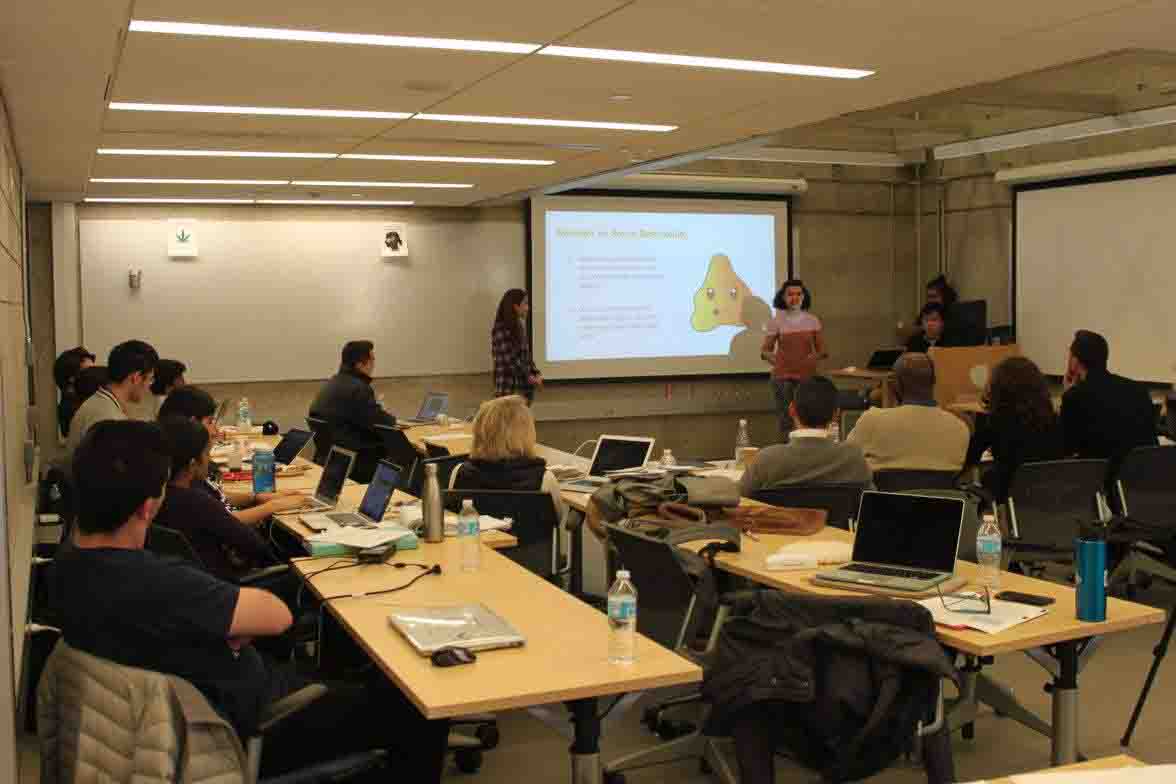
Courtesy of Claire Ong and Kiki Peters
Thirty-one members of the Yale community convened at the Center for Engineering Innovation and Design this past weekend for the Hack the Gap health care hackathon.
According to a press release from the hackathon, the event, sponsored by Bulldog Hacks and InnovateHealth Yale, focused on developing technological solutions to health care disparities in the United States. In less than 24 hours, hackathon participants pitched pain points, formed teams and presented their ideas for solutions.
Monetary prizes consisted of a $250 award for the best-designed prototype, funded by Ximedica, a firm that develops medical products, and a $150 award funded by InnovateHealth Yale, a School of Public Health program that uses entrepreneurship and innovation to promote health. Additionally, Bridge for Billions, an online incubator for early-stage ventures, sponsored a prize to give the team with the most viable business plan access to their three-month online incubation program.
“One key distinction between our hackathon and others is that we aim to address issues that normally aren’t addressed elsewhere, like health care disparities,” said Eric Chen ’19, a co-leader of the hackathon. “We try to have a practical impact and get involved in real-world issues.”
Chen added that Hack the Gap is the third hackathon organized by Bulldog Hacks, a student organization that focuses on using innovation to solve specific health care issues. The theme of the hackathon changes every semester, and previous themes included mental health care and pediatric health care.
According to hackathon co-leader Sarah Ornellas ’19, the hackathon began with a keynote speech from Brita Roy, assistant professor of medicine at the Yale School of Medicine, who spoke about how to positively impact the community to create better outcomes in health issues. Following the keynote, participants pitched their pain points for the hackathon, which served as a brainstorming session and an opportunity for team formation. After forming teams of two to three people, participants worked through the night before presentations on Saturday afternoon, which were judged by individuals involved in entrepreneurship and health care. According to a rubric for the event, solutions were judged on their health impact, innovation, business model, product and presentation.
Participants in the hackathon included undergraduates as well as graduate students from the Yale School of Medicine and School of Public Health, Chen said.
There were even participants from Yale-NUS College. Adam Tonks, a visiting student from Yale-NUS, paired up with fellow Yale-NUS student Geoffrey Martin to develop an integrated system to dispense Narcan, a nasally administered opiate antidote, through dispensary machines in areas with large youth populations and limited access for emergency services.
“It was quite a surprise to read about drug-related issues in the U.S., since crime is dealt with in a very different manner in Singapore,” Tonks said.
Barkley Dai ’20, winner of the Bridge for Billions prize, created a “personalized mental health resources allocation platform for students in less developed areas.” Dai said that his solution aims to address the disparity between mental health resources available for students in urban areas versus those from more rural areas, adding that he was inspired by issues surrounding a mental health stigma in China.
Dai said that as winner of the Bridge for Billions prize, he will work with the incubator startup in further developing his solution and expects modifications to his original plan.
Jacob Fohtung, a mentor for the event who also sponsored the Bridge for Billions prize, said that the online incubator was looking for ideas with the most business potential. The incubation program assists with business creation tools, such as developing a business plan.
Fohtung noted that in the future, similar hackathons can be improved through greater advertisement. He added that changing the location of the event from the CEID to a more central venue may attract more nonengineering students to participate.
The CEID is located at 15 Prospect St. in New Haven.







